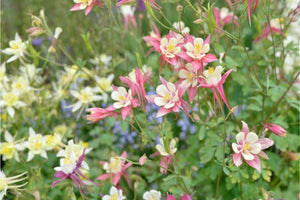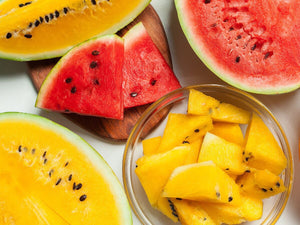From Seed to Spectacular Blooms: How to Grow Dahlias from Seed
DahliaWe love dahlias. They have stunning blooms and are a favorite among flower farmers. I’ve been growing dahlias for a few years and have had some success saving tubers. But the seed-growing enthusiast in me wants to know, can you grow dahlia flowers from seed?

Fortunately, Sow Right Seed sells dahlia seeds. So, what’s the difference between growing dahlias from seed or tubers?
Like most things in nature, when you sow a seed, you have a chance of growing a new variety. When you take a cutting or tuber, you will propagate the exact same plant.
Growing dahlias from seed is how new dahlia varieties are born! We’ll cover the specific things you need to know to grow dahlia seeds successfully. You’ll love these beautiful flowers in your garden.
Growing Dahlia Flowers from Seed
Maybe, like me, you thought that you could only grow dahlia flowers from tubers. But everything has to start with a seed, right? So, of course, there are dahlia seeds. The difference between growing from seed is that you may get something slightly different than you expect. When you take a tuber from a plant, it will produce exactly the same flowers. Technically, it is the same plant. However, when you plant dahlias from seed, you may get something unique because of cross-pollination. (We cover more about that in our seed-saving blog.)
This can be good news or bad, depending on how flexible you are with what kinds of flowers you grow.
Sometimes, you want precisely what you want, and in other situations, it’s fun to see what shows up.
Planting Dahlias from Seed
You can sow dahlia seeds outdoors once all danger of frost is past. Or you can start seeds indoors 6 to 8 weeks before the last frost date.
Starting seeds indoors is our preferred method for two reasons. One is that we can carefully control the growing environment for successful germination and protect fragile seedlings. The other reason is that dahlias can take 100 to 120 days to produce flowers. By starting seeds indoors, you can give your dahlias more time to mature. Adding extra days indoors can extend your growing season, and you’ll appreciate this if you live in a colder growing zone. Start seeds indoors if you want more time to enjoy your dahlia flowers outdoors.
Starting Dahlia Seeds Indoors
Use a seed starting mix and plant dahlia seeds 1/4” deep in individual cells. This will help with spacing and transplanting.
The ideal soil temperature for germinating dahlia seeds is 70ºF. (65º to 75ºF)
Keep the soil moist but not water-logged.
Seeds should germinate in 7 to 10 days.
Once the dahlia seeds have sprouted, water from the bottom to avoid damping off.
Keep grow lights close to the seedlings to keep them from stretching toward the light and becoming spindly.

Transplanting Dahlia Seedlings
When the dahlia seedlings are several inches tall and have at least two sets of true leaves, you can pot them up so they don’t become root-bound.
Be gentle with the roots when transplanting dahlias to avoid transplant shock. Planting in peat pots allows you to transfer the whole pot outdoors without disturbing the roots.
Allow 4 to 5 weeks for the seedlings to grow before hardening them off. You can start hardening off dahlia seedlings two weeks before transplanting outdoors. Hardening off seedlings acclimates them to the outdoor environment, and they will thrive instead of going into shock.
Make sure all danger of frost is past before transplanting dahlia seedlings.
Space dahlia plants 9 to 12 inches apart in full sun.
This is the time to put in stakes or supports to keep the dahlias upright as they grow. Putting supports in while the plants are small will prevent disturbing the roots later.

Growing Dahlia Flowers
Giving your dahlia flowers the right growing conditions will result in beautiful blooms that last until the first fall frost. These delightful flowers can be grown in containers and flowerbeds.
Sun
Full sun will give you the biggest and most beautiful dahlia flowers. A minimum of 6 hours every day. In our experience, dahlias grown in shady gardens produce only a few flowers.
Soil
Dahlias need loose, fertile soil. Keeping soil evenly moist will result in better bloom production. Use compost before planting to create nutrient-rich soil. If your soil is heavy clay, amend it before planting.
Water
Consistent watering is essential for growing dahlias. Flowers need lots of water to produce blooms. Watering at the base of the plant becomes more critical once the flowers are growing. Soaker hoses and drip irrigation are efficient ways to get water where it does the most good.
Fertilizer
When adding additional fertilizer, you want something that will result in more blooms and not just leaf growth. Use a fertilizer with low nitrogen and higher amounts of potassium and phosphorus. Of course, a soil test will give you the starting point and help you know what ratio of NPK you need.
Weeding
Keeping the weeds down will help your plants grow healthy and strong without competition for space and nutrients. You can read about our favorite tools for weeding.
Staking Dahlias
Dahlia plants can grow very tall. Staking them early will keep them from falling over when the wind blows and their flower heads are heavy. Put stakes in early, and as the plant grows, you can tie the stems to the stake to keep them upright. Dwarf varieties will only grow 10 to 16 inches high.

Pinching and Deadheading Dahlias
Pinching back the center when the dahlia plant is small will encourage branching and more blooms. When the plant is about 8” tall, you can pinch or cut off the top. Make the cut right above a leaf node, and new branches will grow.
Deadheading will also encourage more blooms. Cut flowers off above a leaf node throughout the growing season for more flower growth. Dahlias make an excellent focal flower in flower arrangements.
Dahlia Seed Harvesting
Once you have a dahlia plant that you love, you can dig up the tubers to grow next year. You can also save the seeds, although the new plants won’t be exactly the same as the parent plant.
To save dahlia seeds, let the flowers remain on the plant until the seeds fully develop. A seed head will form and dry out. Once the seeds are dry, you can save them in a paper bag in a cool, dry place.

Dahlia Pests and Diseases
Snails and Slugs
Unfortunately, slugs and snails love dahlias too. As soon as the foliage starts growing, use traps and natural methods to keep them from destroying your flowers.
Spider mites
If spider mites become a problem, use a miticide.
Aphids
Keep aphids off your flowers with a blast of water and other natural methods.
We love the beautiful variety of colors and shapes that dahlia seeds produce. Starting dahlias from seed is easy to do and will give you some outstanding blooms in your flower garden. Grab a packet of these dahlia seeds and enjoy a long-lasting summer beauty.
Written by Beverly Laudie
Popular Posts
-

How to Grow Columbine Flowers for a Natural Hummingbird Garden
-

Sweet and Juicy Heirloom Watermelon Varieties to Grow






Leave a comment